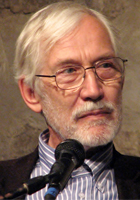Jaan Kaplinski
Jaan Kaplinski Poems
I could have said: I stepped from the bus.
I stood on the dusty roadside where
a young maple and dog-roses grew.
...
Silence is always here and everywhere;
sometimes we hear it more clearly:
on the meadows there is mist, the door of the granary is open,
...
Destruktivität ist das Ergebnis ungelebten Lebens.
Destructivity is the result of an unlived life.
What cannot grow up grows down —
...
Prayer is just what remains
when all is said and there is nothing more to say
God is what remains when all in which one can believe
...
Things didn't remember their names and I have begun to forget them
memory's like a pocket riddled with holes that cannot hold change
words or ideas and some in the Dark Ages knew this already
...
I fear those who are afraid of emptiness
I fear Pascal but not probability theory
I do not fear Roman antiquities for they
...
The possibility of rain… If rain is possible
everything is possible: spinach, lettuce, radish and dill,
even carrots and potatoes, even black
...
The lilac branches are swaying in the wind
and shadows creep across the floor from the open balcony door,
swaying too. Today I washed the windows
...
I write a poem every day,
although I'm not quite sure if these texts
...
The washing never gets done.
The furnace never gets heated.
Books never get read.
...
Jaan Kaplinski Biography
Jaan Kaplinski (born January 22, 1941 in Tartu) is an Estonian poet, philosopher, and culture critic. Kaplinski is known for his independent mind, focus on global issues and support for left-wing/liberal thinking. He has been influenced by Eastern philosophical schools (taoism and especially buddhism). Kaplinski studied Romance language and linguistics at Tartu University, graduating as a French philologist in 1964, and has worked as a translator, editor, and sociologist, and ecologist at the Tallinn Botanic Garden. He has been named as a contender for the Nobel Prize in Literature. Jaan Kaplinski has published numerous collections of poems, prose, and essays. He has translated writings from French, English, Spanish, Chinese, including the Tao Te Ching, and Swedish, the work of Tomas Tranströmer. Kaplinski's own work has been translated into English, Finnish, French, Norwegian, Swedish, Dutch, Icelandic, Hungarian, Japanese, Latvian, Lithuanian, Russian, Hebrew, Bulgarian, and Czech. His essays deal with environmental problems, philosophy of language, classical Chinese poems, philosophy, buddhism, and Estonian nationalism. Some of Kaplinski's poems are originally written in English and Finnish. In the 2000s he began writing in Russian, and his first original Russian collection (composed of some of his poems translated from Estonian into Russian) appeared in 2014 under the title White Butterflies of Night (Белые бабочки ночи) and was awarded in Russia. Jaan Kaplinski was one of the authors and initiators of the so-called Letter of 40 intellectuals (Neljakümne kiri) action. A letter signed by well-known Estonian intellectuals protesting against the behavior of the authorities in Soviet-annexed Estonia was sent to the main newspapers of the time. Although not openly dissident, the letter was never published in the press at that time and those who signed were repressed using administrative measures. His semi-autobiographical novel The Same River is published by Peter Owen in English translation by Susan Wilson.)
The Best Poem Of Jaan Kaplinski
I could have said
I could have said: I stepped from the bus.
I stood on the dusty roadside where
a young maple and dog-roses grew.
But really, I leaped into the silence,
and there was no land, no surface to step on.
The silence closed over my head:
I saw how the bus had just departed,
and sinking deeper and deeper
I heard only my own heart beating,
and in the rhythm of it, I saw my own street
passing with all its well-known signs:
lilies-of-the-valley and Equiseti Silvestres,
Oxalis nearly in flower,
and anthill covered by a brownish ripple —
the ants themselves. The Big Pine. The Big Spruce.
Stackpoles. The Sandhole. The fireplace.
The white trunks of birch trees. The Big Stone.
And many memories. Silence, the inland sea, —
what else could I name for you?
